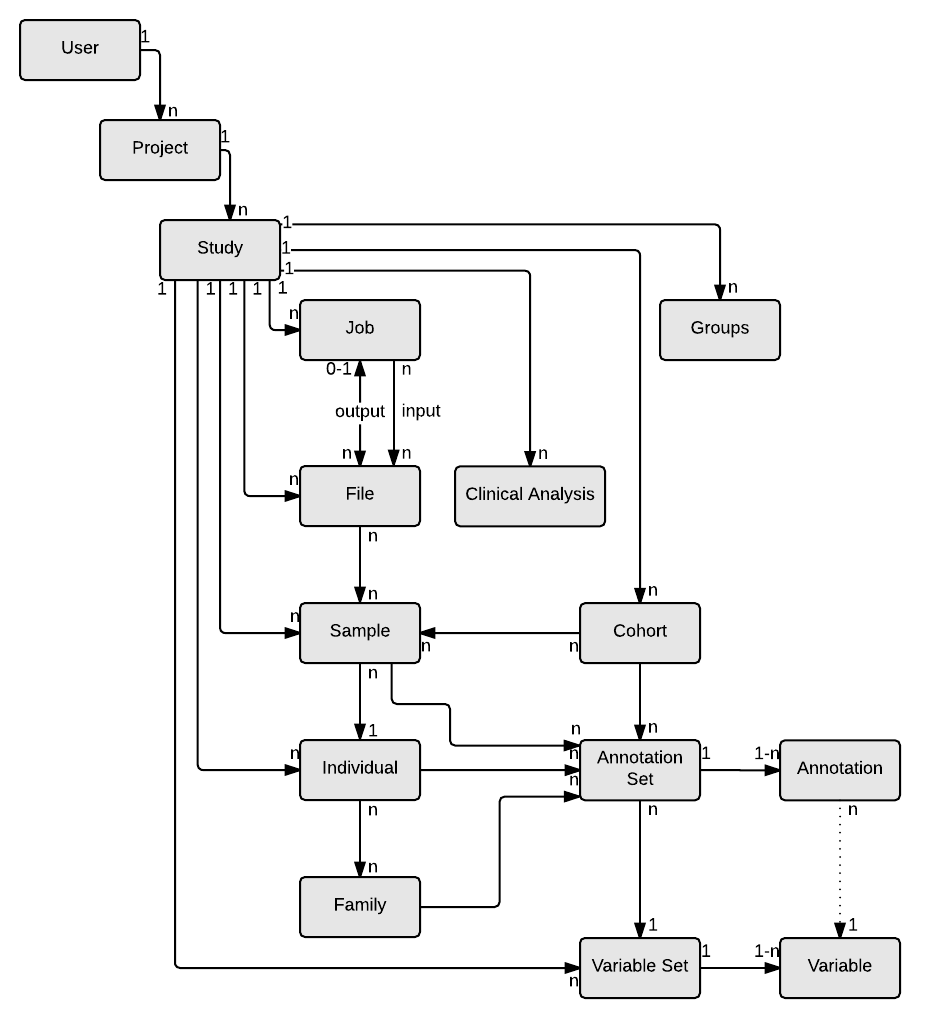- Created by Pedro Furio, last modified on Nov 23, 2017
You are viewing an old version of this page. View the current version.
Compare with Current View Page History
« Previous Version 2 Next »
OpenCGA Catalog allows researchers to store really diverse meta-data. Data models can be found in the right.
Users
A user is generally a person who will be using OpenCGA. The idea in OpenCGA is that every single person have its corresponding user created in OpenCGA. Every user should be authenticated (see Authentication section) to be able to perform any action. However, to be able to perform any actions, users will need to be granted some specific permissions or to have a specific category within the Study (see Sharing and Permissions section).
There are defined two different type of users (referenced in Catalog as the user accounts):
- full: users with permissions to create their own projects and studies.
- guest: users that will not have the possibility to create their own projects and studies. Despite this, these users will still be able to collaborate (view, write...) in other user's studies as long as they have been granted the proper permissions.
Groups
Users can be put together forming a group. A group of users will generally bring together users that have something in common. Groups are strongly related to permissions in Catalog (see Sharing and Permissions section). For example, let's imagine that we have 5 different departments in our institution and each department requires different permissions to the data. In that case, we could think of creating as many groups of users as different departments we have in our institution and give the specific permissions to those groups (not to the users) that have been created in OpenCGA. Doing it this way have lots of benefits:
- A user belonging to different departments (groups) will have the permissions from all the groups he/she belongs to.
- If one user leaves the department, we would just need to remove that user from the corresponding group. That user will automatically lose the permissions the group has*.
- If one user starts in the department, we would just need to add that user to the corresponding group. That user will automatically gain the permissions the group has.
* Unless the user had some or all the permissions granted to the group defined in a different group he/she might still belong to or assigned directly to the user.
Projects
Any "full" user is able to create as many projects as necessary. A project is a piece of planned work or an activity that is finished over a period of time and intended to achieve a particular purpose (Cambridge dictionary definition). A project in Catalog is understood as a scientific project for one concrete species. Any project in Catalog will contain at least a name, an alias (project identifier) and the species organism. But it can also contain the organisation and a description of the project.
Projects are used as the central piece for variants storage.
Studies
Projects are composed by a set of studies. A study is the activity of examining a subject in detail in order to discover new information (Cambridge dictionary definition) Any project owner can create as many studies as necessary. Most of the Catalog data models, except for User and Project belong to a particular Study, so it can be seen as the central piece in OpenCGA Catalog. A Study contains, similarly to Project, a name and an alias (study identifier). Optionally, it can have a description as well.
Groups
Despite the explanation of Groups from a previous section, Groups are actually defined within a Study. Different studies can have different groups of users that are basically defined by the Study owner or administrators. By default, every Study is created with two reserved groups (admins and members). The roles of these two groups is described in Sharing and Permissions section.
Table of Contents:
Remember Catalog Data Models:

- No labels